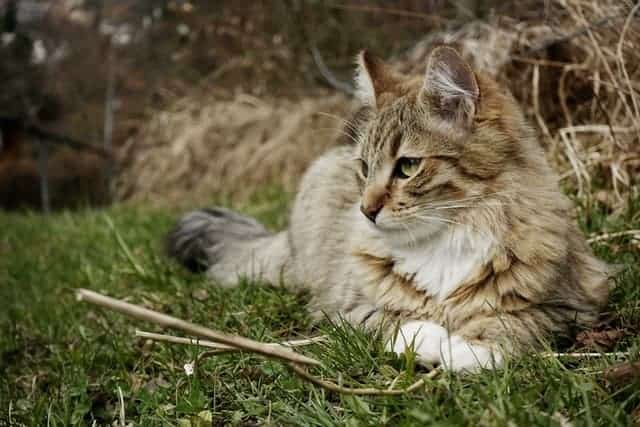
The cat vomits water, a more or less common ailment in our pet. Let’s try to understand what are the causes and symptoms of this problem and how it is possible to intervene for the health of the feline.
There are many ailments that, unfortunately, can affect our furry friend. The health of the cat is what is most important to us and it is not always easy and immediate to recognize a pathology in him. There are some common diseases in pets that you are quite used to but, sometimes, some of them manifest themselves in a curious way, with different symptoms. Today, for example, let’s see why the cat vomits water and how to intervene to remedy it.
The cat vomits water: the possible causes
The feline is an animal that can have various types of vomiting as a symptom. But what does it mean if we notice our furry man throwing up water? We read better in the article.
Our cat can be prone to common diseases such as vomiting and diarrhea. In reality, these are not really diseases but symptoms of a problem related to the animal’s stomach. First, it is important to make a small difference between vomiting and regurgitation. Vomiting, as we have said, can be a sign of another disorder, while regurgitation is the release of saliva or food that has been swallowed but rejected by the stomach. The furry person may vomit for several reasons at home: ingested fur, cold or spoiled food.
When we see the cat vomit a substance that may seem like water, in reality it is gastric juice, the liquid of the stomach, similar to water and which can also mix with white foam and mucus.
The four-legged friend can ingest too much hair or even foreign bodies such as paper, string, rubber, fabrics, which can cause this reaction. But what happens when we see the cat throw up water? When the feline vomits water it may indicate several causes: it happens because the cat drinks a lot of water too quickly, perhaps in a hot condition or because it feels a constant need; the need to drink water can mean the presence of a disease that leads to increased thirst, such as hyperthyroidism in cats, diabetes mellitus and kidney failure.
The cat vomits water even if it has ingested elements or irritants that can damage its stomach, producing ailments such as vomiting and gastritis in the cat. If your cat ingests toxic and dangerous substances, such as shampoos, detergents or detergents, by accidentally licking on the ground or on the sink, it produces gastric juices which lead to this reaction. Medicines, such as anti-inflammatories and antibiotics, can irritate your stomach. The same symptom can also be caused by bacteria or viruses.
Other causes of your dog throwing up water
There are pathologies that affect its digestive system and that can, therefore, favour this symptom in the animal: slow stomach problems, in which gastric juice accumulates; liver disease and pancreatitis in cats also cause symptoms such as nausea and vomiting. Hairballs should not be treated with indifference: they can irritate the mucous membrane of the cat, as well as the ingestion of foreign bodies such as needles and cables. These harmful elements are ingested by mistake by our furry, due to his curiosity.
You have to be very careful, though. These are dangerous items that irritate and damage the stomach linings and can cause other serious complications. It must be said that the feline is very delicate and feels stress. Strong emotions such as fear and sudden excitement can stimulate vomiting in him. Living indoors, he runs the risk of being damaged by some plants that are toxic to the cat. Ornamental plants such as lily and palm are poisonous and deadly to the furry. The reaction begins with the symptom of vomiting, to develop into a kidney failure in the cat.
The feline vomits: how to intervene

When we notice our cat throwing up water, therefore, we can be surprised and we don’t know what to do. How to behave then, especially if the cat has no other symptoms? Let’s find out together.
If we find ourselves in the situation where our cat starts throwing up water, without showing other symptoms, most likely the animal suffers from acute gastritis, or an irritation or inflammation of the stomach. For this reason, it will be necessary to let his stomach rest for up to 24 hours, without making him eat or drink anything, in order to reduce acid secretion. During the rest period, you can offer the cat some ice cubes that will help him not to become dehydrated.
After 24 hours, if the cat has stopped throwing up water, you can resume providing it with water in small quantities and pay attention to its physical reaction, along with small bites of food to recover its nutrition. It is advisable to feed them with very small doses every 4 hours for the first two days. If the vomiting problem persists, however, and the cat continues to vomit abundant water, it is necessary to take the animal to your veterinarian for an urgent check-up. The doctor will almost certainly propose the administration of saline solution to rehydrate the feline.
To prevent this type of disorder, you can follow a few simple rules, such as avoiding leaving small objects around the house and under his eyes; remove toxic products and drugs from his sight ; offer your cat catnip, a solution to prevent your cat from chewing other plants in the house. Taking care of his coat, brushing it frequently, is a way to avoid the formation of hairballs that can be swallowed. Every little kitten attention can be a big help.






